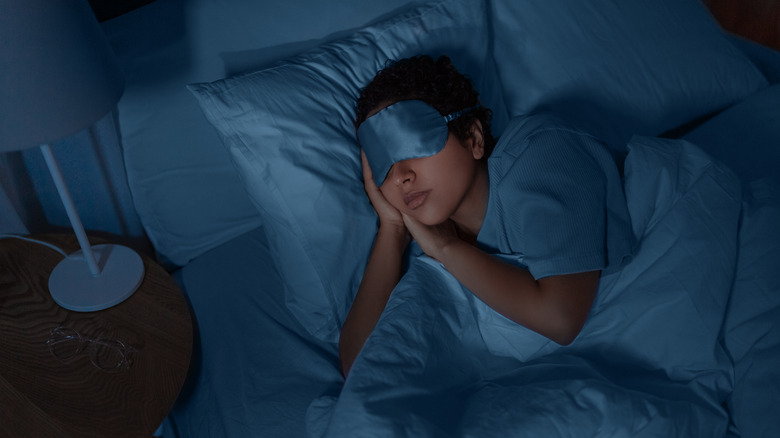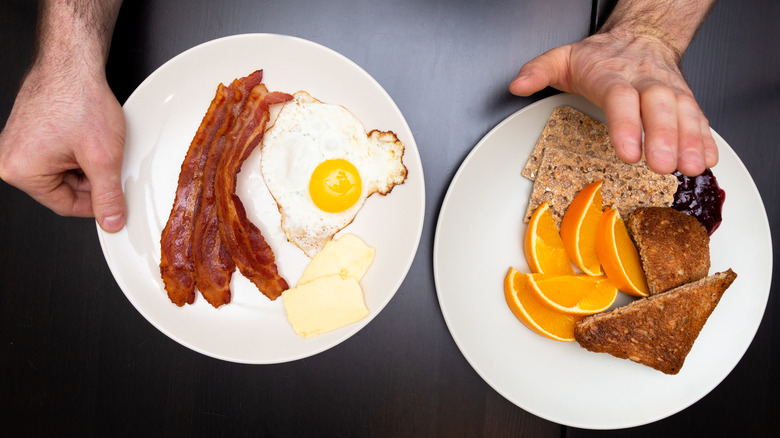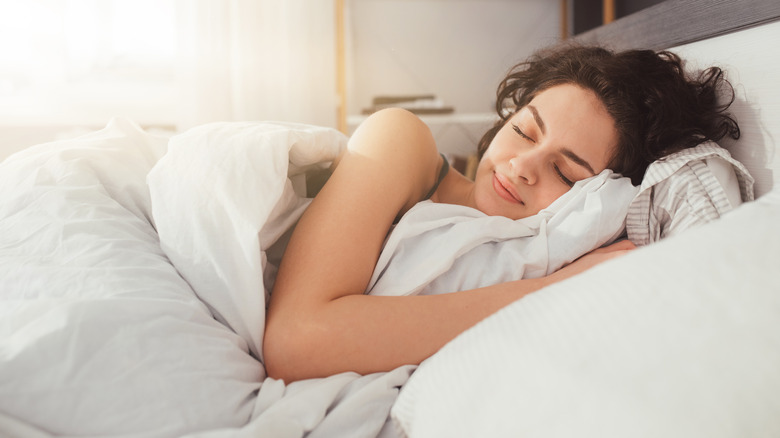Why Keto Eating Might Change How You Sleep
The ketogenic diet has become one of the most popular diets to date. In a world where it seems like every diet has both health benefits and negative side effects, it's tough to know which is a good choice. If you're not big on sweets, keto might be calling. According to Men's Health, the gist of this diet is to cut carbs almost entirely, including anything that has sugar — even certain fruits! Basically, you want to consume no more than 50 grams of carbs per day, and fat is your friend. After several hours of depriving your body of carbs and sugar, you will then enter into a physiological state called ketosis. When your body is in ketosis, it's burning fat instead of glucose for fuel, causing rapid weight loss.
This diet was originally conceived of by Dr. Russel Wilder in the 1920s for those suffering with epilepsy, per the NCBI. Weight loss wasn't Dr. Wilder's goal — however, it is a positive side effect. With a diet that requires extreme changes, it's only natural that your skin, weight, and mental health could be affected, but that's not all: Your sleep changes as well.
Carbs help promote sleep
When you're starting out on the keto diet, your sleep may suffer. According to Insider, the body burns the carbs you consume to supply glucose, which helps L-tryptophan to enter the brain. L-tryptophan is an amino acid that helps produce serotonin. Serotonin is a neurotransmitter that calms the body, which improves the quality of sleep and, well, life in general. To go even further, serotonin converts into melatonin, which facilitates sleep. Because keto consists of very little carbs, not as much L-tryptophan makes it into the brain, which leads to less production of serotonin and therefore melatonin.
The body needs time to adjust to this new system of burning fat instead of glucose for fuel before your sleep schedule can return to normal (per The Sleep Sherpa). While insomnia is inconvenient, it's a telltale sign that your body is entering ketosis, and that you're on the right track. The good news is, it won't be like this for long.
After a week or two, adenosine takes over
While insomnia is less than ideal, once you're over the hump, your sleep improves drastically. According to Psychology Today, studies conducted on obese patients following keto diets found reduced daytime drowsiness and increased REM sleep. This is due to a correlation between the macronutrients you're consuming on a keto diet and a brain chemical that regulates sleep called adenosine.
Adenosine is a central nervous system depressant that enhances sleep. The longer you're awake, the higher your adenosine levels are (via News Medical). Per Psychology Today, studies show that the ketogenic diet facilitates adenosine's relaxing effects. In fact, Insider reported that people consuming a keto diet tend to have better quality sleep than those who aren't on keto. While there haven't been enough studies to fully understand the relationship between adenosine and foods included in the ketogenic diet, it's important to not up your intake of things that block adenosine, such as foods or beverages that contain caffeine like coffee, tea, and even unsweetened chocolate, which is permitted on the diet (via Self Hacked).


